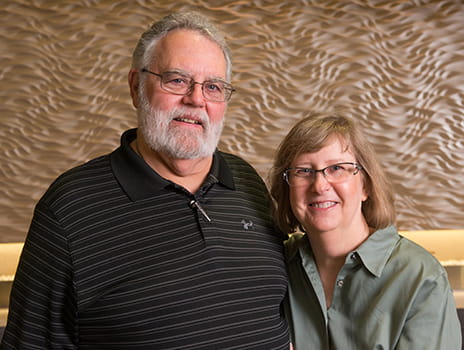Right Place, Right Time for Stroke Recovery

In recognition of the Christmas and New Year’s holidays, some of The University of Kansas Health System’s offices will have modified hours on Thursday, December 25, and Thursday, January 1.

November 01, 2018
Timing is everything. And no one is a bigger believer in the importance of timing than Al and Vicki Denton. Timing saved Al's life – timing and the stroke care team at The University of Kansas Health System.
After surviving 2 heart attacks in 1 year, Al and his wife, Vicki, thought they were sufficiently prepared for what life threw at them. That's why they viewed Al's foot surgery in June 2014 as a routine inconvenience, taking time away from his passion, competitive bowling. But that inconvenience turned out to be great timing.
One Sunday evening in July, Al and Vicki had just finished watching a movie at home. Al should have been driving alone back to his Grandview home from a bowling tournament. But due to his recent foot surgery, he was instead sitting in his recliner when he suffered a massive stroke – and had no idea.
"I never realized the person having the stroke wouldn't know there was something wrong," says Vicki. "He was totally unaware."
But Vicki knew instantly that something was not right. The moment Al started slurring and speaking incoherently, Vicki acted FAST. Standing in front of Al, she told him to smile and watched the left side of his face droop down. She then told him to raise his arms and watched as his left arm fell to his side. That was all she needed. She called 911.

After the ambulance crew confirmed the same FAST steps as Vicki, Al was immediately transported to the nearest hospital, where a scan showed a clot in his brain. As Al's condition worsened to complete immobility on his left side, the community hospital got on the phone with The University of Kansas Health System's Advanced Comprehensive Stroke Center.
The Comprehensive Stroke Center, the first of its kind in Kansas City and one of the first in the nation, determined Al was a primary candidate for a clot removal procedure. Knowing the procedure offered him the best chance for recovery, the referring physician asked permission from Al and Vicki to transfer his care to The University of Kansas Health System and vascular neurologist, Michael Abraham, MD.
"At that point I looked at Vicki and said, 'What do we have to lose?' Because at that point, I still couldn't move," Al says.
With an IV of tPA in his arm, a protein that helps break down blood clots, Al arrived at The University of Kansas Health System's main campus. He was taken directly to Dr. Abraham for an endovascular procedure to remove the blood clot. During the minimally invasive procedure, Dr. Abraham positioned a stent retriever in the clot for a few minutes. When he retracted the device from the blood vessel, the clot was removed with it and blood flow was restored to Al's brain instantly.
"The turnaround was almost instantaneous," Al says.
When he arrived at The University of Kansas Hospital, he scored a very poor 18 on the National Institutes of Health Stroke Scale, indicating a severe stroke. He also had no mobility on his left side. After treatment, only a few hours later, Al raised his left hand and waved at Vicki. She stayed by his side until he was released Wednesday morning with a stroke scale of zero and no need for physical therapy. Al was back on a bowling lane 2 weeks later.
"My recovery was pretty amazing. I'm back to 95% of where I was before the stroke," Al says. "Thank God Vicki was aware of what to look for."
Vicki credits her quick thinking to awareness of the signs and knowing that time is the most important factor to consider when it comes to stroke. "Know the symptoms of stroke, but make sure you get to a hospital right away," Vicki urges. "If there's ever a question, go in right away."
"Everything happens for a purpose, I suppose. It just wasn't my turn," Al says.
"We've been very lucky and thankful," Vicki agrees.
"Yes, I'm very thankful," Al says, pointing at Vicki with a wide smile.